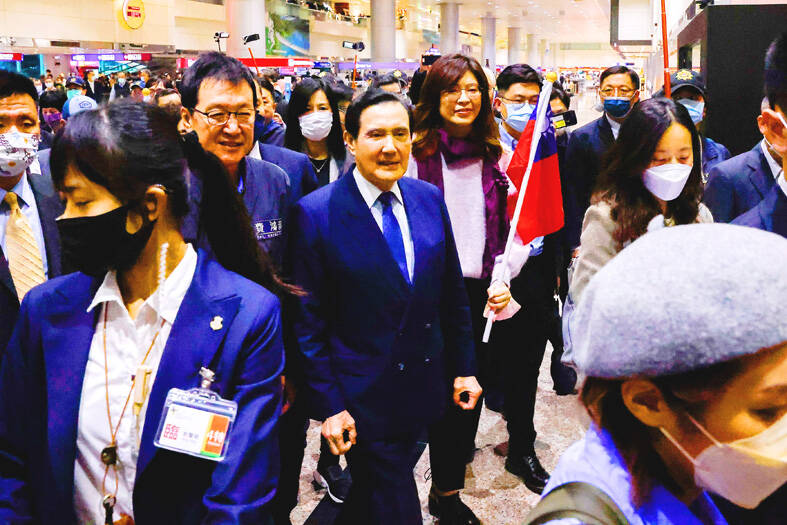Former president Ma Ying-jeou (馬英九) was belittled by Beijing during his trip to China, as he was only able to meet China’s Taiwan Affairs Office (TAO) Director Song Tao (宋濤) and was not greeted by higher- ranking Chinese officials during his visit, which has harmed Taiwan, academics said on Friday.
Ma said the trip was to pay his respects to his ancestors and to accompany 28 Taiwanese university students for exchanges with students in China, but they only met with 35 students at Wuhan University, 32 students at Hunan University and 30 students at Fudan University.
The Chinese government could easily mobilize thousands of students to attend Ma’s exchange sessions if it wanted, but there were only about 30 students in each session, Cross-Strait Policy Association researcher Wu Se-chih (吳瑟致) said, adding that it seems that Ma was used as Beijing’s tool to counter President Tsai Ing-wen’s (蔡英文) visit to Central America and stopovers in the US.

Photo: Ann Wang, REUTERS
Before Ma left for China, there were rumors that Chinese Vice Premier Ding Xuexiang (丁薛祥) would welcome Ma at the airport, and some had guessed that he would be greeted by Chinese Communist Party (CCP) Politburo Standing Committee member Wang Huning (王滬寧), who met Chinese Nationalist Party (KMT) Vice Chairman Andrew Hsia (夏立言) in Beijing in February, Cross-Strait Policy Association secretary-general Wang Zhin-sheng (王智盛) said.
However, Ma was not greeted by either of them, and only met with Song in Wuhan on short notice, Wang Zhin-sheng said.
Ma “went for the sake of going,” regardless of which members of the Chinese government arranged to meet with him, and he disguised his dream of saying he is Chinese by pretending it was a trip to pay respects to his ancestors along with student interactions, he said.
Ma cooperated with the Chinese government in praising Wuhan’s COVID-19 response, but Beijing still does not view him as a former president or former KMT chairman, but used him as part of its “united front” tactics for political gain, Wang Zhin-sheng said.
Ma is willing to be a “chess piece” of China, to put pressure on Taiwan, belittle its nation status and harm it, Wu said, adding that he must face criticism from Taiwanese, as they have seen how a politician and a former president can be so selfish for his own political gain.
Ma and the KMT are pleased with his trip, claiming that he elaborated on the so-called “1992 consensus,” with “each side [of the Taiwan Strait] having its own interpretation on ‘one China,’” yet although the Chinese government did not refute it in his face, it does not mean it accepts it, Wang said.
The definition and interpretation of the so-called “1992 consensus” are still in the hands of China, so Ma’s trip did not revive the “1992 consensus,” he said, adding that it is merely “terminal lucidity” as it goes into history.

Taiwan has received more than US$70 million in royalties as of the end of last year from developing the F-16V jet as countries worldwide purchase or upgrade to this popular model, government and military officials said on Saturday. Taiwan funded the development of the F-16V jet and ended up the sole investor as other countries withdrew from the program. Now the F-16V is increasingly popular and countries must pay Taiwan a percentage in royalties when they purchase new F-16V aircraft or upgrade older F-16 models. The next five years are expected to be the peak for these royalties, with Taiwan potentially earning

STAY IN YOUR LANE: As the US and Israel attack Iran, the ministry has warned China not to overstep by including Taiwanese citizens in its evacuation orders The Ministry of Foreign Affairs (MOFA) yesterday rebuked a statement by China’s embassy in Israel that it would evacuate Taiwanese holders of Chinese travel documents from Israel amid the latter’s escalating conflict with Iran. Tensions have risen across the Middle East in the wake of US and Israeli airstrikes on Iran beginning Saturday. China subsequently issued an evacuation notice for its citizens. In a news release, the Chinese embassy in Israel said holders of “Taiwan compatriot permits (台胞證)” issued to Taiwanese nationals by Chinese authorities for travel to China — could register for evacuation to Egypt. In Taipei, the ministry yesterday said Taiwan

‘LIKE-MINDED PARTNER’: Tako van Popta said it would be inappropriate to delay signing the deal with Taiwan because of China, adding he would promote the issue Canadian senators have stressed Taiwan’s importance for international trade and expressed enthusiasm for ensuring the Taiwan-Canada trade cooperation framework agreement is implemented this year. Representative to Canada Harry Tseng (曾厚仁) in an interview with the Central News Agency (CNA) said he was increasingly uneasy about Ottawa’s delays in signing the agreement, especially as Ottawa has warmed toward Beijing. There are “no negotiations left. Not only [is it] initialed, we have three versions of the text ready: English, French and Mandarin,” Tseng said. “That tells you how close we are to the final signature.” Tseng said that he hoped Canadian Prime Minister Mark Carney

POSITIVE DEVELOPMENT: Japan and the US are expected to hold in-depth discussions on Taiwan-related issues during the meeting next month, Japanese sources said The holding of a Japan-US leaders’ meeting ahead of US President Donald Trump’s visit to China is positive news for Taiwan, former Japan-Taiwan Exchange Association representative Hiroyasu Izumi said yesterday. After the Liberal Democratic Party’s landslide victory in Japan’s House of Representatives election, Japanese Prime Minister Sanae Takaichi is scheduled to visit the US next month, where she is to meet with Trump ahead of the US president’s planned visit to China from March 31 to April 2 for a meeting with Chinese President Xi Jinping (習近平). Japan and the US are expected to hold in-depth discussions on Taiwan-related issues during the